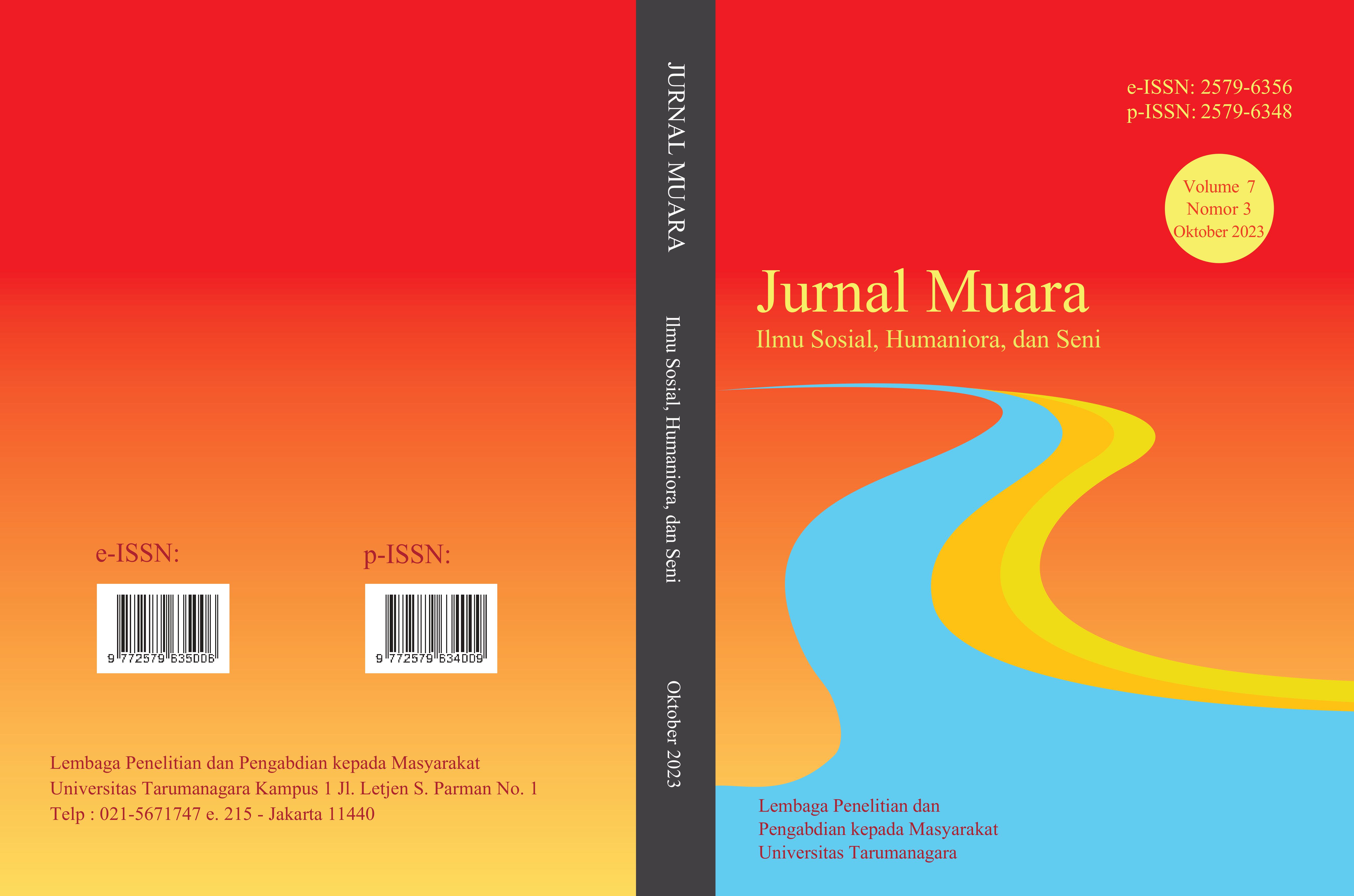PERAN SELF – EFFICACY TERHADAP KEPUASAN MAHASISWA PADA MASA PEMBELAJARAN POST COVID–19 DENGAN MOTIVASI SEBAGAI MODERATOR
Main Article Content
Abstract
Pada akhir tahun 2022, Peraturan Pembatasan Kegiatan Masyarakat (PPKM) telah resmi dicabut serta memasuki transisi pada masa post COVID–19. Sektor seperti pendidikan perguruan tinggi juga kembali mengalami peralihan, sepert metode belajar mengajar yang kembali secara luar jaringan (luring) atau hybrid, layanan administrasi yang juga kembali secara luring atau hybrid, dan adanya perubahan kurikulum pada sistem pendidikan saat ini. Berbagai perubahan dalam metode belajar mengajar, layanan administrasi, serta kurikulum memberikan dampak terhadap self–efficacy dan motivasi mahasiswa yang berkaitan dengan kepuasan. Tujuan dari penelitian ini adalah melihat peran self–efficacy terhadap kepuasan mahasiswa pada masa endemi COVID–19 yang dimoderasi dengan motivasi. Penelitian melibatkan 502 responden, dengan metode pengumpulan data menggunakan kuesioner yang terdiri atas General Self–Efficacy Scale (GSES) (α = 0.667), Course Satisfaction Scale (α = 0.575), dan Academic Motivation Scale (AMS) (α = 0.742). Hasil temuan dalam penelitian ini, didapati korelasi positif antara kepuasan self–efficacy dengan kepuasan mahasiswa (r = 0.455), korelasi positif antara self–efficacy dan motivasi (r = 0.138), serta korelasi positif antara motivasi dan kepuasan mahasiswa (r = 0.216). Didapati juga peran self–efficacy terhadap kepuasan mahasiswa sebesar 29,9% (R² = 0.299) mengalami peningkatan menjadi 32% (R² = 0.320) setelah dilakukan pengujian self–efficacy dengan moderator motivasi. Dapat disimpulkan bahwa motivasi terbukti berperan sebagai moderator dalam penelitian ini.
Article Details
Section

This work is licensed under a Creative Commons Attribution-NonCommercial-ShareAlike 4.0 International License.
This work is licensed under a Jurnal Muara Ilmu Sosial, Humaniora, dan Seni Creative Commons Attribution-ShareAlike 4.0 International License.References
Azila-Gbettor, E.M., Mensah, C., & Abiemo, M.K. (2022). Self-efficacy and academic programme satisfaction: mediating effect of meaningfulness of study. International Journal of Educational Management. https://doi.org/10.1108/ijem-09-2021-0353
Badan Pusat Statistik. (2022). Statistik Pendidikan (4301002). https://t.ly/AGcu4
Bayrak, F., Tibi, M. H., & Altun, A. (2020). Development of online course satisfaction scale. Turkish Online Journal of Distance Education, 110-123. https://doi.org/10.17718/tojde.803378
Chau, S., & Cheung, C. (2018). Academic satisfaction with hospitality and tourism education in Macao: The influence of active learning, academic motivation, and student engagement. Asia Pacific Journal of Education, 38(4), 473-487. https://doi.org/10.1080/02188791.2018.1500350
Cherian, J., & Jacob, J. (2013). Impact of self-efficacy on motivation and performance of employees. International Journal of Business and Management, 8(14). https://doi.org/10.5539/ijbm.v8n14p80
Chirikov, I., Semenova, T., Maloshonok, N., Bettinger, E., & Kizilcec, R. F. (2020). Online education platforms scale college STEM instruction with equivalent learning outcomes at lower cost. Science Advances, 6(15), 1-10. https://doi.org/10.1126/sciadv.aay5324
Doménech-Betoret, F., Abellán-Roselló, L., & Gómez-Artiga, A. (2017). Self-Efficacy, Satisfaction, and Academic Achievement: The Mediator Role of Students' Expectancy-Value Beliefs. Frontiers in Psychology, 8. https://doi.org/10.3389/fpsyg.2017.01193
Herwin, Safruddin, C., Jabar, A., Senen, A., & Wuryandani, W. (2020). The evaluation of learning services during the COVID-19 pandemic. Universal Journal of Educational Research, 8(11), 5926-5933. https://doi.org/10.13189/ujer.2020.082227
Herwin, H., Fathurrohman, F., Wuryandani, W., Dahalan, S. C., Suparlan, S., Firmansyah, F., & Kurniawati, K. (2022). Evaluation of structural and measurement models of student satisfaction in online learning. International Journal of Evaluation and Research in Education (IJERE), 11(1), 152. https://doi.org/10.11591/ijere.v11i1.22115
Hwang, J., & Wao, F. (2021). College student satisfaction typology and its relationship with engagement patterns. Journal of College Student Development, 62(1), 118-124. https://doi.org/10.1353/csd.2021.0009
James, P. C. (2021). What determines student satisfaction in an E-learning environment? A comprehensive literature review of key success factors. Higher Education Studies, 11(3). https://doi.org/10.5539/hes.v11n3p1
Kéri, A. (2020). Engaging students. The Challenges of Analyzing Social and Economic Processes in the 21st Century.
Meng, Q., & Zhang, Q. (2023). The Influence of Academic Self-Efficacy on University Students’ Academic Performance: The Mediating Effect of Academic Engagement. Sustainability. https://doi.org/10.3390/su15075767
Misnan, N., Zakaria, Z., & Salleh, W.A. (2018). Service Quality: A Study of Students Satisfaction in Higher Institution. The Journal of Social Sciences Research. https://doi.org/10.32861/jssr.spi2.490.497
Nababan, G., & Yugopuspito, P. (2022). Efektivitas model blended learning Tipe flipped classroom Terhadap Keterlibatan Siswa, Kemandirian Belajar, Dan Penguasaan Konsep Siswa Kelas IX Pada Pelajaran IPA Di Sekolah XYZ. Jurnal Ilmiah Mandala Education, 8(4). https://doi.org/10.58258/jime.v8i4.3878
Penanganan COVID-19. (2022, December 30). Pemerintah Resmi Cabut Kebijakan PPKM Mulai Hari Ini. https://covid19.go.id/artikel/2022/12/30/pemerintah-resmi-cabut-kebijakan-ppkm-mulai-hari-ini
Prifti, R. (2020). Self–efficacy and student satisfaction in the context of blended learning courses. Open Learning: The Journal of Open, Distance and e-Learning, 37(2), 111-125. https://doi.org/10.1080/02680513.2020.1755642
Schunk, D. H., & DiBenedetto, M. K. (2021). Self-efficacy and human motivation. Advances in Motivation Science, 153-179. https://doi.org/10.1016/bs.adms.2020.10.001
Schwarzer, R., & Jerusalem, M. (1995). General self-efficacy scale. PsycTESTS Dataset. https://doi.org/10.1037/t00393-000
She, L., Ma, L., Jan, A., Sharif Nia, H., & Rahmatpour, P. (2021). Online learning satisfaction during COVID-19 pandemic among Chinese University students: The serial mediation model. Frontiers in Psychology, 12. https://doi.org/10.3389/fpsyg.2021.743936
Sukma, E., Indriyani, V., & Suriani, A. (2022). Blended learning vs hybrid learning: Perspektif guru tentang Pembelajaran Di Sekolah Dasar Pasca-COVID-19. Elementary: Jurnal Iilmiah Pendidikan Dasar, 8(2), 28. https://doi.org/10.32332/elementary.v8i2.4821
Srivastava, S. (2018). Impact of Motivation on Management Student’s Academic Performance in Relation to overall Advancement. International Journal of Advance Research, Ideas and Innovations in Technology, 4, 214-217.
Tang, Y., Wu, H., & Zhou, Y. (2022). Motivation in College Student Study. Advances in Social Science, Education and Humanities Research. https://doi.org/10.2991/assehr.k.211220.040
Tarmizi, S., Ahmad, R.B., Sipon, S., Sawai, R.P., Mahyuddin, M.K., Tazzif, M.H., & Khan, A. (2019). The Self-Efficacy, Self-Regulation and Academic Motivation among Students. Indian Journal of Public Health Research & Development. https://doi.org/10.5958/0976-5506.2019.00917.3
Than, N. N., & Khaing, W. W. (2022). A meta-analysis on factors influencing student satisfaction in higher education. Journal of The Myanmar Academy of Arts and Science, 18(9),393- 404. https://www.researchgate.net/publication/352441674
Tratnik, A., Urh, M., & Jereb, E. (2017). Student satisfaction with an online and a face-to-face business English course in a higher education context. Innovations in Education and Teaching International, 56(1), 36-45. https://doi.org/10.1080/14703297.2017.1374875
Ugwuanyi, C. S., Okeke, C. I., & Ageda, T. A. (2020). Motivation and self-efficacy as predictors of learners’ academic achievement. Journal of Sociology and Antropology, 11(3-4), 215-222. https://doi.org/10.31901/24566764.2020/11.3-4.351
Yu, H., & Mocan, N.H. (2018). The Impact of High School Curriculum on Confidence, Academic Success, and Mental and Physical Well-Being of University Students. Journal of Labor Research, 40, 428 - 462. https://doi.org/10.3386/W24573
